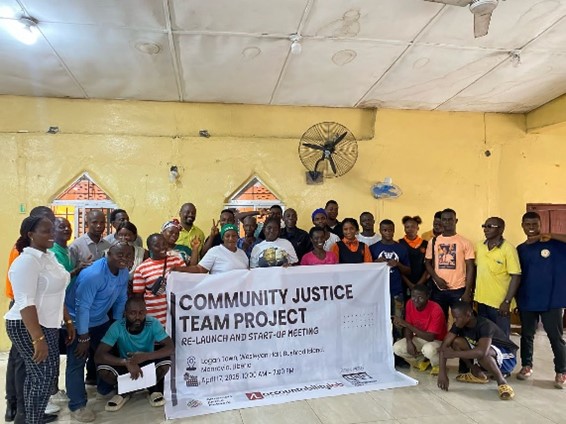The Accountability Lab Liberia, in collaboration with the Citizens Bureau and supported by the Legal Empowerment Fund, has relaunched a community justice project aimed at curbing mob violence and promoting adherence to the rule of law in several communities in Montserrado County, Liberia, and its surrounding areas. The project, re-launched in Logan Town, a community on Bushrod Island, seeks to empower citizens to resolve disputes peacefully and rely on established legal processes rather than resorting to extrajudicial actions. This initiative builds on previous work conducted by the organizations in Montserrado, Margibi, and Bong counties, highlighting the importance of community-based solutions to address the pervasive issue of mob justice. The program emphasizes trust in the legal system and provides alternative avenues for conflict resolution, promoting dialogue and mediation to prevent escalation into violence.
The re-launch event underscored the critical need to address the root causes of mob violence, which often stems from a lack of faith in the formal justice system and a perceived distance between communities and law enforcement. Lawrence Yealue, Executive Director of Accountability Lab Liberia, stressed the detrimental impact of mob justice on the rule of law and the overall peace and stability of communities. He emphasized the importance of engaging community elders and mediators in resolving disputes, providing a readily accessible alternative to violent retribution. The program aims to equip community members with the knowledge and skills to manage conflict peacefully, emphasizing dialogue, mediation, and respect for legal processes.
The project’s core strategy involves training community members as mediators, empowering them to facilitate conflict resolution within their communities. This approach emphasizes accessibility and trust, as individuals are more likely to engage in constructive dialogue with familiar faces within their own communities, rather than navigating the often complex and intimidating formal legal system. John Kamma, Executive Director of Citizens Bureau, highlighted the effectiveness of this approach, noting the absence of recidivism in cases handled by trained mediators. This success underscores the potential of community-based interventions to address the underlying causes of conflict and promote lasting peace.
The project also includes a “cross-country collaboration” element, encouraging the sharing of experiences and best practices among different communities, fostering learning and strengthening the network of mediators. This exchange of knowledge will further enhance the capacity of communities to address local disputes effectively. By fostering communication and collaboration between communities, the project aims to create a ripple effect, spreading its positive impact beyond the initially targeted areas.
The re-launch event was attended by a diverse cross-section of the community, including youth, women, students, and elders, demonstrating broad-based support for the initiative. The presence of Blamoh T. Cheteh, a representative from the local police, signified recognition from law enforcement of the project’s value in complementing their efforts to maintain order and reduce crime. Leroy J. Nyankoon, a community dweller from Blamo Town, voiced appreciation for the program, recognizing its potential to empower community members to understand and exercise their rights while promoting peaceful conflict resolution.
The collaborative effort between Accountability Lab Liberia, the Citizens Bureau, and the Legal Empowerment Fund represents a significant step toward strengthening community-based justice mechanisms in Liberia. By empowering citizens to resolve disputes peacefully and promoting trust in the rule of law, the project aims to create safer, more peaceful communities and contribute to the long-term stability and development of the country. The focus on community involvement, capacity building, and knowledge sharing ensures the project’s sustainability and maximizes its potential to achieve lasting positive change. The success of this project could serve as a model for other communities grappling with similar challenges related to mob violence and access to justice.














